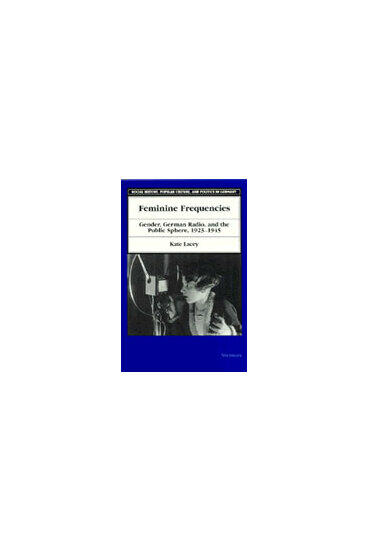Feminine Frequencies
Gender, German Radio, and the Public Sphere 1923-1945
Provides the first sustained historical account of the Frauenfunk, women's radio programming in Weimar and Nazi Germany
Description
The years following World War I in Germany saw the simultaneous emergence of radio as a public medium entering the private sphere of the home and the large-scale emergence of women entering the public sphere of politics and production. In Feminine Frequencies, Kate Lacey examines the mutual implications of these important developments and provides a distinctive analysis of radio in the Weimar Republic and the Third Reich which not only restores women to the history of radio, but identifies and investigates the impact of gender politics on the development of German broadcasting.
At the heart of the book is an exploration of radio programming for women from the mid-1920s to the end of World War II. Largely through the Frauenfunk, radio transformed women's domestic life, mediated women's experience of modernity and war, and worked to integrate women into the modern consumer culture, the national economy, and eventually the "national community" of the Volksgemeinschaft. At the same time, decisions about how that programming was to operate influenced the way radio was conceived as a broadcast rather than an interactive technology.
Ultimately, the cultural practice and propaganda of the Third Reich were anticipated in and enabled by the legacy of broadcasting in the Weimar Republic. Feminine Frequencies confronts the consequences of a missed opportunity to harness the democratic potential of a new medium of communication.
Based on original archival research, and interdisciplinary in approach, this book will be of great interest to students and scholars in German studies, women's studies, and media studies.
Kate Lacey is Lecturer in Media Studies, School of European Studies, University of Sussex.
Reviews
". . . there is a solid piece of research contained in this study. . . . The politics of radio, the history of women's broadcasting and what it says about power in state and society, the way radio revolutionized the domestic activities of women--advising, informing, and educating--all are well treated."
- Choice
--Choice
". . . a valuable study that sheds light on a neglected aspect of the history of the modern media in Germany and contributes to our knowledge of the history of gender relations."
- Karl Cristian Fuehrer, University of Oldenburg
--Karl Cristian Fuehrer, University of Oldenburg, German History, Volume 17, No. 4
". . . a very thorough, excellent, and highly engaging study. It is certainly a very important contribution to the field of German Studies."
- Jennifer M. Kapczynski, University of California, Berkeley
--Jennifer M. Kapczynski, University of California, Berkeley, German Quarterly, Winter 2000
". . . represents exhaustive research and is highly recommended to anyone interested in the role of mass media in German history."
- History: Reviews of New Books
--History: Reviews of New Books
". . . [a] well-documented, insightful book. . . ."
- Journal of Women's History
--Journal of Women's History, Winter 2000

